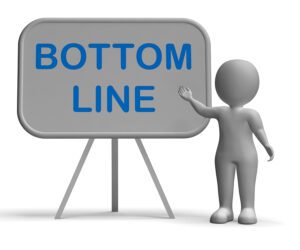Recruiting Quality Talent Contributes to Your Bottom Line
Based on decades of experience and deep industry knowledge as brand marketing and consumer insights recruiters, O’Connell Group shares best practices and useful insights to help you build your team.
Thomas Jefferson’s stirring words in the Declaration of Independence, “We hold these truths to be self-evident: that all men are created equal, that they are endowed by their creator with certain inalienable rights…” are true about human rights, not human talent.
If all talent were equal, then every employee could perform every role equally well, and all should be paid identically and permitted to choose whatever role they want. If all talent were equal, then people would be an interchangeable commodity. Yet, we know that talent is NOT a commodity. Talent is individual and unique. Talent is different from, and transcends, skills, knowledge and experience.
When you’ve got to make a strategic hire, it’s ALL about the quality of the talent you hire and their contribution to your bottom line.
The key to a successful search is recognizing that talent is the cornerstone of each individual’s ability to produce and contribute to your organization. We advise clients to hire for tale nt first, then for skills and/or experience. Our reasoning is simple: an “A” quality talent who does not yet have a skill or an experience can rapidly acquire that skill or experience, and then you will have an “A” quality talent who has the desired skills and experience. A “B” quality talent who already has the desired skills and experience will almost always remain a “B” quality talent. Most of our clients over the years have agreed that “A” quality players are more desirable than “B” quality players.
nt first, then for skills and/or experience. Our reasoning is simple: an “A” quality talent who does not yet have a skill or an experience can rapidly acquire that skill or experience, and then you will have an “A” quality talent who has the desired skills and experience. A “B” quality talent who already has the desired skills and experience will almost always remain a “B” quality talent. Most of our clients over the years have agreed that “A” quality players are more desirable than “B” quality players.
Based on over 25 years of research, Gallup defines talent as “a recurring pattern of thought, feeling or behavior that can be productively applied.” A critical part of getting recruiting right is to identify the talents that are most important for success in a given role, and recruit for those talents. Does the position require a strategic thinker? Or is it more important that the successful candidate be comfortable managing numerous day-to-day projects and meeting deadlines.
Talent is productive capacity. Talent is an asset.
This impact on business results is understood very clearly in economic theory. In modern economic theory, a company that invests in people who have the talent to produce and deliver value to their customers will increase the rate of return on its investments in human capital. This belief has helped drive the American economy’s phenomenal productivity increases over the past half century. Economic theory is right: people are a business’s best asset.
Strategic and successful hiring managers view talent, and talent acquisition, as an investment, not an expense. Therefore, best way to approach a strategic hire is to focus on the value per hire over time, not cost per hire.
When you are making the business case to invest in the strategic hire of a professional with the talent to contribute to your bottom line, contact us to consult with experts who can help you measure the value of the right hire over time.
